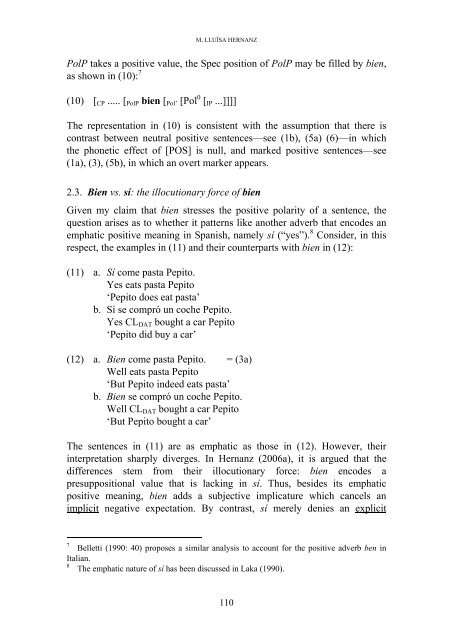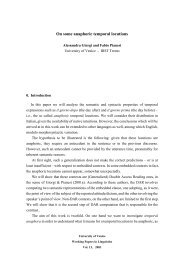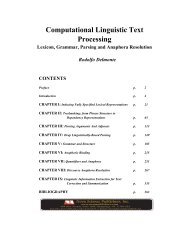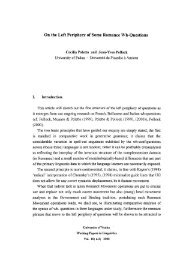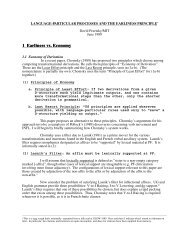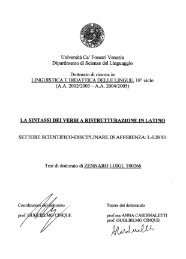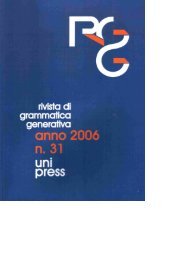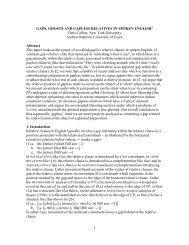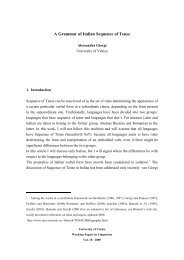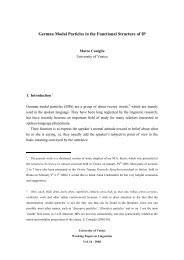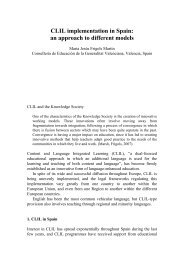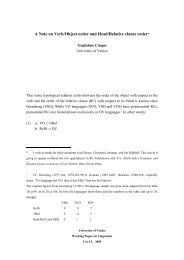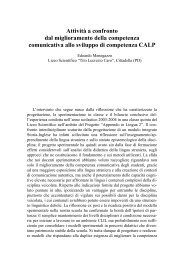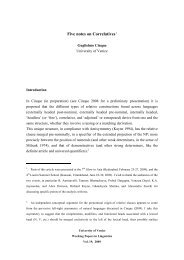Emphatic Polarity and C in Spanish - Lear
Emphatic Polarity and C in Spanish - Lear
Emphatic Polarity and C in Spanish - Lear
Create successful ePaper yourself
Turn your PDF publications into a flip-book with our unique Google optimized e-Paper software.
M. LLUÏSA HERNANZ<br />
PolP takes a positive value, the Spec position of PolP may be filled by bien,<br />
as shown <strong>in</strong> (10): 7<br />
(10) [CP ..... [PolP bien [Pol’ [Pol 0 [IP ...]]]]<br />
The representation <strong>in</strong> (10) is consistent with the assumption that there is<br />
contrast between neutral positive sentences—see (1b), (5a) (6)—<strong>in</strong> which<br />
the phonetic effect of [POS] is null, <strong>and</strong> marked positive sentences—see<br />
(1a), (3), (5b), <strong>in</strong> which an overt marker appears.<br />
2.3. Bien vs. sí: the illocutionary force of bien<br />
Given my claim that bien stresses the positive polarity of a sentence, the<br />
question arises as to whether it patterns like another adverb that encodes an<br />
emphatic positive mean<strong>in</strong>g <strong>in</strong> <strong>Spanish</strong>, namely sí (“yes”). 8 Consider, <strong>in</strong> this<br />
respect, the examples <strong>in</strong> (11) <strong>and</strong> their counterparts with bien <strong>in</strong> (12):<br />
(11) a. Sí come pasta Pepito.<br />
Yes eats pasta Pepito<br />
‘Pepito does eat pasta’<br />
b. Sí se compró un coche Pepito.<br />
Yes CLDAT bought a car Pepito<br />
‘Pepito did buy a car’<br />
(12) a. Bien come pasta Pepito. = (3a)<br />
Well eats pasta Pepito<br />
‘But Pepito <strong>in</strong>deed eats pasta’<br />
b. Bien se compró un coche Pepito.<br />
Well CLDAT bought a car Pepito<br />
‘But Pepito bought a car’<br />
The sentences <strong>in</strong> (11) are as emphatic as those <strong>in</strong> (12). However, their<br />
<strong>in</strong>terpretation sharply diverges. In Hernanz (2006a), it is argued that the<br />
differences stem from their illocutionary force: bien encodes a<br />
presuppositional value that is lack<strong>in</strong>g <strong>in</strong> sí. Thus, besides its emphatic<br />
positive mean<strong>in</strong>g, bien adds a subjective implicature which cancels an<br />
implicit negative expectation. By contrast, sí merely denies an explicit<br />
7<br />
Belletti (1990: 40) proposes a similar analysis to account for the positive adverb ben <strong>in</strong><br />
Italian.<br />
8<br />
The emphatic nature of sí has been discussed <strong>in</strong> Laka (1990).<br />
110


